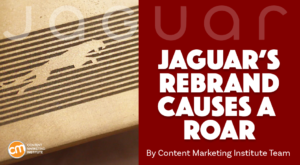
The recent security advisory from Drupal.org is clear: “Drupal 9 is end-of-life as of November 1, 2023. There will be no further development, security fixes, or enhancements; all support for Drupal 9 will stop.” Drupal is a widely used open source CMS.
This announcement is a critical signal for CMOs to prioritize upgrading to Drupal 10. The move is a technical and strategic necessity for upholding a secure, compliant, and advanced martech stack.
Urgency and opportunity: The Drupal 9 end-of-life
In the face of this transition, TMotions, a Drupal service provider, casts the end-of-life event positively in a blog post: “Drupal 9 EOL represents a new beginning rather than an end. It’s an opportunity for growth, innovation, and embracing the next evolution of Drupal. This transition opens doors to enhanced features, improved performance, and increased security, ensuring that Drupal remains a leader in web development.” This perspective is especially relevant as CMOs consider the broader implications of the upgrade.
Continuing to operate on Drupal 9 post-EOL increases the risk of security breaches, as vulnerabilities may become public that will only be patched in the more recent, supported versions of Drupal, as noted by Mark Dorison, CTO at Chromatic, a web agency specializing in Drupal migrations. While user experience and performance won’t degrade post-EOL, they will not receive any further improvements, emphasizing the need for an upgrade to sustain competitive advantage.
Conversely, migrating to Drupal 10 offers a chance to reassess and reinforce marketing technologies, ensuring that investments in the digital ecosystem are robust and future-ready.
Planning your Drupal 10 migration
Transitioning to Drupal 10 requires thorough preparations to ensure a smooth and successful upgrade. Key steps include:
- Auditing your current Drupal 9 site and modules to identify high-risk or deprecated elements.
- Testing upgrade paths in staging environments.
- Establishing timelines aligned with business initiatives.
- Assembling cross-functional teams with technical and business stakeholders.
- Documenting processes and contingency plans.
- Working with expert consultants to navigate complexities.
Investing in robust planning and diligent execution can minimize disruptions while allowing you to maximize the opportunities of moving to an up-to-date and supported Drupal 10 platform.
The upgrade path: Technical and strategic insights
Migrating to Drupal 10 is essential for securing your martech stack and maintaining a competitive edge. Expert guidance facilitates the technical process and ensures alignment with business strategy, enhancing your martech stack’s effectiveness. “Even skilled teams can benefit from Drupal upgrade experts,” noted Bob Watson, VP of client engagement and partner alliances at consulting and staffing firm Elevate Digital. “Their specialized experience smooths the transition by navigating complexities and avoiding pitfalls.”
Chromatic’s Dorison says the progression from Drupal 8 and 9 to 10 is designed to be more user-friendly, mitigating previous upgrade challenges. With features like the ability to configure the SameSite value for cookies, a more intuitive front-end theme, content management features, and the introduction of the Layout Builder, Drupal 10 promotes better user experiences and offers more control over site design.
Furthermore, Drupal 10’s commitment to ease of use and administrator efficiency is evident in its automatic updates feature, simplifying the management of security patches and core updates. Coupled with a comprehensive Content Security Policy, Drupal 10 ensures a more efficient, secure, and user-friendly platform. These advancements contribute to faster load times and improved response rates, reinforcing your site’s security and preparing it for a robust future online.
Bottom line. EOL for Drupal 9 presents risks in security, compatibility, compliance, and UX, but also a chance to upgrade and enhance the digital experience. With careful planning and consideration, you can migrate to Drupal 10 and ensure your website(s) remain compliant, performant, and safe.
The martech stack audit: A blueprint for future growth
A martech stack audit, conducted during Drupal 9’s end-of-life, is more than a technicality; it’s a strategic recalibration of marketing technologies for future trends and customer engagement. In the context of upgrading to Drupal 10, a martech stack audit is more than a routine checkup; it’s a strategic overhaul to ensure seamless integration and alignment with business objectives. Benefits include:
- Understanding Value and Operations. An audit helps clarify how each technology contributes to business operations and customer experience, ensuring that all tools are aligned with business goals.
- Enhanced Collaboration. By evaluating the martech stack, teams can better understand the tools at their disposal, leading to improved collaboration and efficiency.
- Identification of Gaps and Redundancies. Audits can reveal overlaps and gaps in the technology stack, allowing companies to streamline their tools and reduce unnecessary spending.
- Insights for Improvement: Through an audit, companies gain insights into their marketing efforts, which can drive strategic decisions and improvements.
- Driving User Adoption and Satisfaction. An audit identifies which tools users favor and why, which can inform training and adoption strategies.
- Optimization for Better ROI. By assessing the current stack, companies can optimize their tools to achieve better returns on their marketing investments.
- Future-Proofing. Audits offer insights into performance and scalability, preparing the stack to meet upcoming business challenges.
Dig deeper: What are headless or hybrid content management systems?
Integrating upgrade and audit: A strategy for sustained growth
The transition to Drupal 10 is more than an upgrade — it’s a catalyst for marketing transformation. The martech stack audit is critical to this journey, offering a lens to scrutinize and refine your marketing technology landscape. Both initiatives ensure your investments in your digital ecosystem are protected and primed to deliver maximum value.
Adopting Drupal 10 transcends a mere upgrade; it’s an impetus for marketing transformation. Integrating the upgrade with a martech stack audit enhances your marketing technology investments’ effectiveness by treating them as complementary parts of a unified strategy.
This interconnected approach assures that the new functionalities and efficiencies gained from Drupal 10 enrich the entire martech stack, leading to a more robust, agile, and future-proof digital marketing strategy. By aligning these efforts, CMOs can foster a more collaborative environment, streamline their technology ecosystem, and unlock a higher return on investment, all while setting the stage for the next wave of digital innovation and customer engagement.
Get MarTech! Daily. Free. In your inbox.
Opinions expressed in this article are those of the guest author and not necessarily MarTech. Staff authors are listed here.




